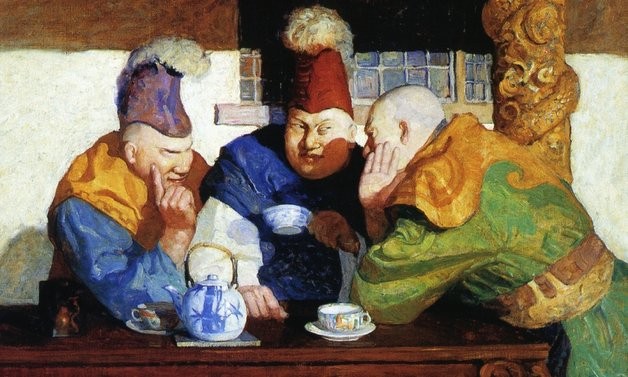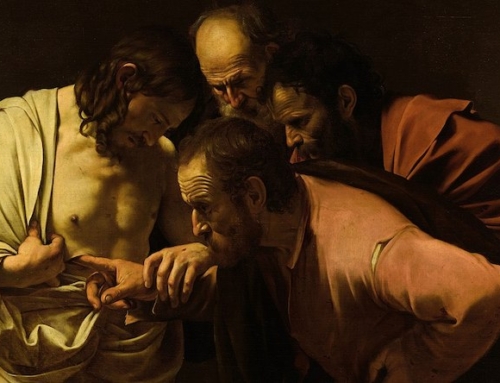When a man gets ordained, the first thing that generally happens after he bestows first blessings is that those who know him throw a huge party. And this makes sense; when something beautiful happens, we want to get everyone together and celebrate, whether the occasion is an ordination, a wedding, a graduation, or making it through Wednesday. Not celebrating a really landmark event might even be a sign of a spiritual malady, like a dour Puritanism that looks askance at levity, or a false humility that preens by being seen refusing honors.
On this Holy Thursday, as we commemorate Jesus’ institution of the Church, the Eucharist and the priesthood as their perpetual servant, we might wonder what the apostles did all those years ago to celebrate their ordination.
St. Luke gives us an answer: they fought. After Jesus prophesies his betrayal, “they began to question one another, which of them it was that would do this. A dispute also arose among them, which of them was to be regarded as the greatest” (Lk 22:23-24).
But why did they fight? Why couldn’t they turn to the Lord? St. Luke gives us the answer again in the same passage. Here the disciples are, newly ordained, having received Jesus in the Eucharist for the first time, under the eyes of their Lord himself, and to whom do they turn when they need help figuring out a hard saying? Each other. Reclining next to Divine Wisdom, they compared notes on their own ignorance. They probably thought they were figuring out a major truth—and who was first among the apostles is a major truth—and maybe even doing Jesus a favor. Or maybe they were enthralled with their own joy over what had just happened to them, and in the midst of celebrating they became so wrapped up in their own affairs that they forgot about Jesus entirely.
The apostles’ mistake is easy to repeat; the challenge of the Gospel—the challenge of reality—can be overwhelming. It’s easier to take refuge in self-referentiality, to compare notes with ourselves and squabble with or flatter each other, than to admit our own ignorance and mediocrity to the Lord. Reclining in pettiness is easier than being challenged to greatness.
Pope Francis addressed this tendency in the Church last year during an interview with La Stampa: “We need to avoid,” he said, “the spiritual sickness of a Church that is wrapped up in its own world: when a Church becomes like this, it grows sick.”
This is not an abstract concern, especially as the surrounding culture becomes more secular and Christianity becomes, at least sociologically, more of a niche practice. The dire temptation that faces us now is self-referentiality: despairing of our pseudo-pagan society and buffeted by cultural losses like same-sex marriage, abortion, and euthanasia, the idea of shaking the dust of the modern world off our feet and retreating into our own protected enclaves is enticing. No one wants to listen to us on moral matters, so we stop talking to them and only talk to ourselves about how no one listens to us; the professional film industry has no time for Christianity, so we abandon professionalism and make schlocky propaganda for God and congratulate ourselves on our artistic integrity; hardly anyone comes to a ministry event, and rather than rethinking our approach, we blithely say that our events get more people than St. So-and-so’s, and give handshakes all around. A Perpetual Adoration Society can be hard to fill; a Mutual Adoration Society will be full to bursting.
The challenge the Church faces is not one of relevance vs. antiquarianism, liberalism vs. conservatism, or any of the old, hackneyed false dichotomies that we sometimes use as a crutch to simplify our lives. Our challenge is to deal with reality as it really is, to acknowledge what we don’t know and can’t do, and to ask Jesus to change in us what needs to be changed.
The mission that Jesus gives us to make disciples of all nations involves risk, labor, and maybe even discomfort. But the mission is not good because it’s hard; it’s hard because it’s good, and we are not! We need Jesus to pull us out of our internal reveries, our selfishness, our self-referentiality; and we need to allow ourselves to be drawn, to be transformed by the beauty of his face. And then we are free to meet our fellow men, as they are and where they are. And that encounter, too, may change us.
As Pope Francis continued,
“It is true that going out onto the street implies the risk of accidents happening, as they would to any ordinary man or woman. But if the Church stays wrapped up in itself, it will age. And if I had to choose between a wounded Church that goes out onto the streets and a sick, withdrawn Church, I would definitely choose the first one.”
This Holy Thursday, as we commemorate the sacred moment when Jesus Christ gave us the Church, the Eucharist, and his priesthood, may our celebration be a supplication: Free us from ourselves. Let our wounds be yours.
✠
Image: N.C. Wyeth, The Unwrit Dogma







